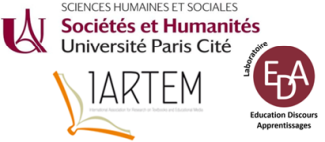This paper is part of Sylvie Mas's thesis. The thesis focuses on the professionalization of teachers and its renewals linked to the rise of digital social networks and its uses by teachers and teacher collectives (Beauné et al., 2019; Lantz-Anderson et al., 2018). Indeed, some of the most active teachers online are playing a growing role in the posting and renewal of their resources by their peers, notably proposing new informal training situations.
We're interested in so-called "influencer" teachers. By this, we mean teachers in a position to exert an influence mediated by X (Twitter) on the members of their professional network. We interrogate this understanding of "influencer" by focusing on those individuals who have this presumed position of influence according to the platform's metrics. Their actual influence remains presumed (our data do not allow us to assess this aspect). We estimated this position of influence according to three criteria: the intensity of connectivity in the network, the size of the audience, and the frequency of publication. Among the most connected individuals on a given topic, we selected those with an audience of over 1,500 followers and an average publication frequency of more than one post (tweet) per day.
In a recent article, we analyzed the discursive productions of three "influencer" teachers (Mas & Normand, 2023). We considered their discursive productions as a set of actions linked to the design of the platform contributing to the construction of their meaning. To this end, we developed a method that takes into account actions prior to the writing of published content. The aim of this method was to provide a preliminary to the linguistic analysis of the content carried by the platform.
Our communication project is a continuation of this work. We plan to present the results of a contrastive analysis of the discursive productions of a set of influential accounts on X(Twitter) dedicated by the educational institution to sharing pedagogical resources. These accounts are dedicated to different teaching disciplines and are hosted by teachers who are said to be "experts" in their discipline, and who represent, via these accounts, the Direction générale de l'enseignement scolaire (Dgesco) and the Direction du Numérique pour l'Éducation (DNE).
Our analysis will be based on observation of the pre-publication actions that define the format of publication, using the method we developed earlier: how do these "expert" teachers representing the educational institution on X (Twitter) mobilize actions relating to the format of dissemination of their discursive productions? We'll complete the analysis with a qualitative approach to the internal content of the publications: what uses do these teachers make of images, typography and punctuation, hashtags, mentions and emojis, enunciative deictics and stylistic devices? To what end are these means put to use? We'll also be looking at the extent to which these different accounts share common interaction practices, given that they share a common goal.
The study of this set of institutional accounts aims to shed light, by contrast, on the discourse of "influencer" teachers on this same platform. A discourse that shapes their image, through what they say and how they say it (Maingueneau, 2016). Our approach at the nexus of linguistics, educational sciences and information and communication sciences aims to provide a better understanding of how these "influencer" teachers contribute to professional training.
Références
Beauné, A., Levoin, X., Bruillard, E., et al (2019). Collectifs en réseau d'enseignants producteurs de ressources, Rapport scientifique des laboratoires STEF et EDA. Convention DNE. Université Paris 5 Sorbonne Descartes ; ENS Cachan. URL : https://hal.science/hal-02022830 /file/rapport_final.pdf
Maingueneau, D. (2016). L'ethos discursif et le défi du Web, Itinéraires [En ligne], 2015-3, mis en ligne le 01 juillet 2016. DOI : https://doi.org/10.4000/itineraires.3000
Mas, S. et Normand, S. (2023). Affordances et contenu des productions discursives sur Twitter (X) : le cas de trois enseignants « influenceurs ». Espaces Linguistiques, (6). https://doi. org/10. 25965/espaces-linguistiques.600

 PDF version
PDF version
